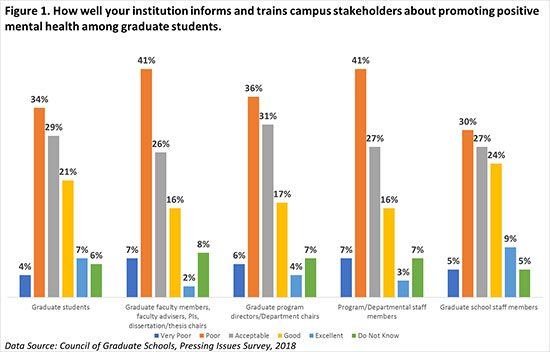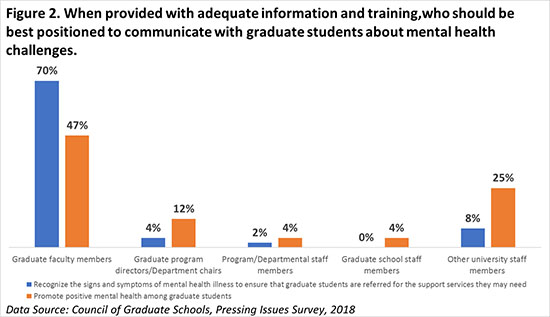You are on CGS' Legacy Site.
Thank you for visiting CGS! You are currently using CGS' legacy site, which is no longer supported. For up-to-date information, including publications purchasing and meeting information, please visit cgsnet.org.

Hironao Okahana, Associate Vice President, Research & Policy Analysis
A number of recent studies have drawn attention to the mental health challenges experienced by graduate students.[1] Studies note that the prevalence of mental health challenges among PhD students is higher than that of the highly-educated general population, and much higher than in the general population.[2] The most recent study published in Nature Biotechnology reported that 39% of their participants, mostly doctoral candidates, fell into the moderate-to-severe depression range,[3] while other studies reported that one in two PhD students has experienced psychological distress, and one in three is at risk of a common psychiatric disorder.[4] Some factors known to adversely affect the mental wellness of graduate students have also been noted in CGS’s recently concluded “Doctoral Initiative on Minority Attrition and Completion (National Science Foundation grant number 1138814)” project. In that study, we found that underrepresented minority doctoral candidates in science, technology, engineering, and mathematics fields were more likely to feel isolated from other students and worried about their mental or physical health than their peers[5].
The challenges surrounding mental wellness of master’s and doctoral students are at the forefront of the minds of many graduate deans in the CGS community. In the 2018 CGS Pressing Issues Survey[6], 63% of respondents strongly agreed or agreed that current graduate students struggle to maintain mental wellness more than students five years ago. Only 10% of respondents disagreed with the statement and none strongly disagreed. However, even with this heightened awareness about mental health challenges among graduate students, graduate deans also seem concerned that campus stakeholders may not currently be equipped to address these challenges.
Identifying Mental Health Challenges
When asked how well their institutions inform and train various campus stakeholders to recognize symptoms of mental health challenges in graduate students and in turn refer those students to appropriate support services, many graduate deans who responded expressed concern that their institutions weren’t doing enough. Notably, the results suggest that more than four out of ten graduate deans think that more can be done to inform and train graduate faculty members, faculty advisers, PIs, and dissertation/thesis chairs, as well as graduate program directors/department chairs and graduate students themselves. Only 21% of deans reported that their institutions do an excellent or good job of informing and training graduate faculty members. About one out of ten respondents (11%) reported that they do not know if graduate students are informed or trained about symptoms of mental health issues.
However, we also learned that support services for mental health are available at institutions. In the 2017 CGS Pressing Issues Survey[7], 96% of CGS member graduate deans who responded indicated that mental health support and crisis counseling are provided either by their graduate schools and/or by other units at their institutions. Yet, the results from the 2018 survey suggest that institutions are not doing as well at informing and training graduate school stakeholders to recognize and refer students with mental health challenges to the appropriate and available resources at their campuses. This is problematic, particularly given that 70% of graduate deans in the 2018 survey felt that when provided with adequate information and training, graduate faculty members—including faculty advisers, PIs, and dissertation/thesis chairs—should be best positioned to recognize the signs and symptoms of mental health challenges and ensure that graduate students are referred to appropriate support services. Graduate schools may have a role here in better connecting graduate students with available resources through their graduate faculty members.

Promoting Mental Wellness
Of the graduate deans who responded to the survey, 33% reported that their institutions are doing a good or excellent job of training and informing graduate school staff members to promote positive mental health among graduate students. However, many graduate deans also felt that institutions are not doing enough to inform and train various graduate education stakeholder groups to promote positive mental health among graduate students. Notably, nearly half of responding graduate deans indicated that their institutions are doing a poor or very poor job of informing and training graduate faculty members, faculty advisers, PIs, and dissertation/thesis chairs. This is another area in which graduate schools have the potential to engage more graduate faculty members to promote positive mental health among graduate students: 47% of graduate deans also felt that when provided with adequate information and training, graduate faculty members should be best positioned to promote positive mental health among graduate students.

Moving the Conversation Forward
Graduate student mental wellness is a key area of priority for the graduate education community and CGS is committed to advancing the national conversation. At the 2017 CGS Annual Meeting, we held a concurrent session on Supporting Students With Mental Health Challenges, and at the upcoming CGS Summer Workshop in Chicago this July, Mona Shattell, chair and professor in the College of Nursing at Rush University, will give a plenary talk on supporting graduate student health and wellness. Also at the Summer Workshop, there will be a Dean’s Toolbox session about evidence-based strategies for supporting graduate student well-being and success, using an example from Texas A&M University. We encourage you to be there and to be a part of this important conversation.
CGS is also beginning to formulate a series of projects and initiatives that aim to facilitate culture change in academia and to destigmatize mental health support-seeking, while promoting mental wellness among master’s and doctoral students. As a first step toward this goal, we are preparing a white paper that addresses some of the foundational questions about trends in graduate student mental health challenges and ways for graduate schools and graduate school leaders to play more integral roles in promoting the mental wellness of master’s and doctoral students. As we draft this paper, which we will share with CGS members, we will explore examples of currently available resources and will reach out to member deans for insights. While we will conduct a scan of the landscape of both extant literature and institutional practices, it is also helpful to crowdsource some of the cutting-edge ideas among our member institutions. If you have any promising approaches, new initiatives, and insights in promoting mental wellness among master’s and doctoral students, we invite you to share them with us.
[1] Flaherty, C. (2018, March 6). Mental Health Crisis for Grad Students. Retrieved from https://www.insidehighered.com/news/2018/03/06/new-study-says-graduate-students-mental-health-crisis.
[2] Evans, TM., Bira, L., Gastelum, GB., Weiss, LT., and Vanderford, NL. (2018). Evidence for a Mental Health Crisis in Graduate Education. Nature Biotechnology, 36(3): 282-284, as well as Table 4 in Levecque, Anseel, De Beuckelaer (2017). Levecque, K., Anseel, F., De Beuckelaer, A., Van der Heyden, J., & Gisle, L. (2017). Work organization and mental health problems in PhD students. Research Policy, 46(4), 868–879. doi:10.1016/j.respol.2017.02.008. For reference, 1 in 5 American adults experience mental illness in any given year. (https://www.nimh.nih.gov/health/statistics/prevalence/any-mental-illness-ami-among-us-adults.shtml)
[3] Evans, TM., Bira, L., Gastelum, GB., Weiss, LT., and Vanderford, NL. (2018). Evidence for a Mental Health Crisis in Graduate Education. Nature Biotechnology, 36(3): 282-284.
[4] Eisenberg, D., Hunt, J., & Speer, N. (2013). Mental health in American colleges and universities. Journal of Nervous and Mental Disease, 201(1), 60–67. doi:10.1097/nmd.0b013e31827ab077; Hyun, J.K., Quinn, B.C., Madon, T. & Lustig, S. (2006). Graduate student mental health: Needs assessment and utilization of counseling services. Journal of College Student Development, 47(3): 247-266.
[5] Sowell, R., Allum, J., & Okahana, H. (2015). Doctoral Initiative on Minority Attrition & Completion. Washington, DC: Council of Graduate Schools.
[6] The 2018 CGS Pressing Issues Survey was sent to all U.S. and Canadian based CGS member institutions in February 2018, and asked graduate deans among other questions: How prevalent are mental health disorders among graduate students?; and Who is best positioned to recognize when a graduate student needs to be referred for mental health support services? In total, 204 or 42% responded to this survey.
[7] The 2017 CGS Pressing Issues Survey was sent to all U.S. and Canadian based CGS member institutions in February 2017. The survey asked a range of questions regarding priorities for graduate deans, graduate schools, and their home institutions for the upcoming twelve months, as well as observations of graduate application trends. In total, 205 or 42% responded to this survey.
The author thanks Julia Michaels, former CGS staff member, for her contribution to the literature review in this piece.




